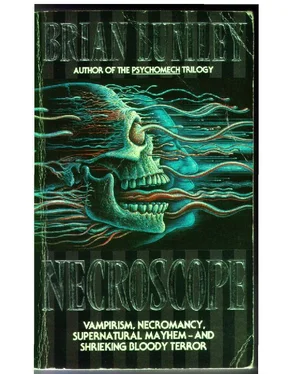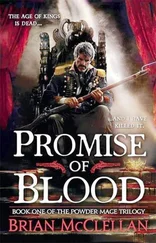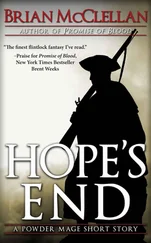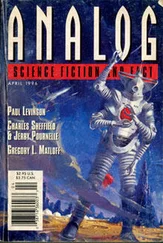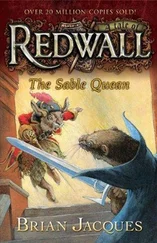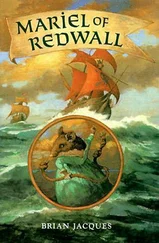'And you can really empty them of secrets? After they are dead, I mean?' Batu seemed to have doubts.
'Yes, I really can. More surely than any torturer could when they were alive. I shall steal their innermost thoughts right out of their blood, their marrow, their cold and lonely bones.'
A dumpy stewardess appeared at the cabin end of the central aisle. 'Fasten your seatbelts,' she intoned like a robot; and the passengers, equally robotic, complied.
'What are your limitations?' Batu asked. 'Strictly out of morbid curiosity, of course.' 'Limitations? How do you mean?' 'What if a man has been dead for a week, for example?' Dragosani shrugged. 'It makes no difference.'
'What if he has been dead for a hundred years?'
'A dried-up mummy, you mean? Borowitz wondered the same thing. We experimented. It was all the same to me. The dead cannot keep their secrets from a necromancer.' 'But a corpse, rotting,' Batu pressed. 'Say someone dead for a month or two. That must be quite awful…'
'It is,' said the other. 'But I'm used to it. The mess doesn't bother me so much as the risk. The dead teem with disease, you know. I have to be very careful. It's not a healthy business.'
'Ugh!' said Batu, and Dragosani actually saw him give a small shudder.
London's lights were gleaming in the dark distance on the curve of night's horizon. The city was a hazy glow beyond the small, circular windows. 'And you?' said Dragosani. 'Does your talent have its "limitations", Max?'
The Mongol gave a shrug. 'It, too, has its dangers. It requires much energy; it saps my strength; it is debilitating. And as you know, it is only effective against the weak and infirm. There is supposed to be one other small handicap, too, but that is a matter of legend and I do not intend to put it to the test.'
'Oh?'
'Yes. There is a story told in my country of a man with the evil eye. It's an old story, going back a thousand years. This man was very evil and used his power to terrorise the land. He would ride with his bandits into villages and rape and plunder, then ride out again unscathed. And no one dared hold up a hand against him. But in one village there lived an old man who said he knew how to deal with him. When the robber band was seen riding that way, the villagers took all their corpses and gave them spears and propped them on the walls. The robbers came and in the dusk their leader saw that the village was protected. He cast his evil eye upon the watchers at the walls. But of course, the dead cannot die twice. The spell rebounded and struck him down. He was shrivelled up no larger than a roasted piglet!'
Dragosani liked the story. 'And the moral?' he asked.
Batu grunted and shrugged again. 'Doesn't it speak for
itself? One must never curse the dead, I suppose, for they have nothing to lose. In any argument, they must always win in the end…'
Dragosani thought of Thibor Ferenczy. And what of the undead? he wondered. Do they, too, always win? If so, then it's about time someone changed the rules …
They were met and whisked through Customs by 'a man from the embassy', their baggage delivered as if by magic to a black Mercedes bearing diplomatic plates. As well as their cold-eyed escort there was also a silent, uniformed driver. On their way to the embassy their escort sat in the front passenger's seat, his body half-turned towards them, his arm draped casually along the back of the driver's seat. He made small-talk in a frigid, mechanical fashion, trying to assume an air of friendly interest. He didn't fool Dragosani for a minute.
'Your first time in London, Comrades? You'll find it an interesting city, I'm sure. Decadent, of course, and full of fools, but interesting for all that. I, er, didn't have time to check on your business here. How long do you plan to stay?'
'Until we go back,' said Dragosani.
'Ah!' the other smiled thinly, patiently. 'Very good! You must excuse me, Comrade, but for some of us curiosity is — shall we say — a way of life? You understand?'
Dragosani nodded. 'Yes, I understand. You're KGB.'
The man's thin face went icy in a moment. 'We don't use that term much outside the embassy.'
'What term do you use?' smiled Max Batu, his voice a deceptive whisper. 'Shitheads?'
'What?' the escort's face slowly turned white.
'My friend and I are here on business which is no concern of you or yours,' said Dragosani in a level tone.
'We have the very highest authority. Let me make that clear: the Very Highest Authority. Any interference will be very bad for you. If we need your help we will ask for it. Apart from that you'll leave us alone and not bother us.'
The escort pursed his lips, drew one long, slow breath. 'People don't usually talk to me like that', he said, his words very precise.
'Of course if you persist in obstructing us,' Dragosani continued, without changing his tone of voice, 'I can always break your arm. That should keep you out of the way for two or three weeks at least.'
The other gasped. 'You threaten me?'
'No, I make you a promise.' But Dragosani knew he wasn't getting anywhere. This was a typical KGB automaton. The necromancer sighed, said: 'Look, if you have been tasked to us I'm sorry for you. Your job is impossible. Moreover it's dangerous. This much I'll tell you, and this much only. We're here to test a secret weapon. Now, ask no more questions.'
'A secret weapon?' said the other, his eyes widening. 'Ah!' He looked from Dragosani to Batu and back again. 'What weapon?'
Dragosani smiled grimly. Well, he had warned the fool. 'Max,' he said, carefully turning his face away. 'A small demonstration, perhaps…?'
Shortly after that they arrived at the embassy. In the grounds of the place Dragosani and Batu stepped down from the car and took their luggage from the boot. They looked after their own cases.
The driver attended to their escort. The last they saw of him was as he staggered away, leaning on the driver's arm. He looked back at them only once — stared round-eyed and fearfully at Max Batu — before stumblingly disappearing inside the gloomily imposing building. And that was the last they saw of him. After that no one bothered them again.
The second Wednesday after New Year, 1977. Viktor Shukshin had known this feeling of encroaching doom for well over a fortnight now, a leaden psychic depression which had lifted only marginally upon the arrival of Gregor Borowitz's fourth monthly registered letter containing one thousand pounds in large denomination notes. In fact it worried Shukshin that Borowitz had surrendered so readily, that he had made no counter threats of his own.
Today had been especially bad: the skies were overcast and heavy with snow; the river was frozen over with thick grey ice; the big house was cold and seemed invaded by icy draughts that followed Shukshin everywhere. And for the first time in as long as he could remember — or at least the first time that he had noticed it — there was a strange and ominous quiet about everything, so that sounds seemed muffled as if by deep snow, though little had fallen as yet. The ticking of an old grandfather clock sounded heavy, dull — even the warped floorboards seemed to creak a little less volubly — and all in all it had put Shukshin's nerves in a very bad way. It was as if the house held its breath and waited for something.
That 'something' came at 2:30 p.m., just as Shukshin poured himself a glass of iced vodka and sat down in his study before an electric fire, looking gloomily out through neglected, fly-specked windows on a garden frozen into white crystal. It came with the nerve-jangling clamour of his telephone.
Heart hammering, he put down the drink he'd almost spilled, snatched up the handset and said, 'Shukshin.'
'Stepfather?' Harry Keogh's voice seemed very close.
Читать дальше
